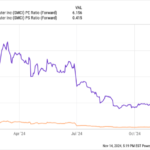These “Magnificent Seven” stocks – Apple, Microsoft, Nvidia, Amazon, Alphabet, Meta Platforms, and Tesla – have significantly outperformed the stock market over the last five years. For instance, Microsoft, one of the group’s standout performers, boasts a compound annual growth rate (CAGR) of 26%, nearly doubling the return of the S&P 500 (15%).
But the important question for investors is not just what these stocks have achieved in the past, but what potential lies ahead to propel them to even greater heights.

Image source: Getty Images.
Unstoppable Growth: Meta Platforms
One of the “Magnificent Seven” stocks that holds immense potential for investors is Meta Platforms.
Meta, the parent company of social networking giants like Facebook and Instagram, boasts a user base exceeding 3.3 billion monthly active users, equivalent to about 40% of the global population.
With such vast reach, Meta rakes in billions from ad revenues on its platforms. In the second quarter of this year alone, Meta reported a staggering $39 billion in revenue, with a massive 98% of it stemming from ad sales.
Despite its colossal scale and heavy reliance on digital advertising, Meta demonstrates relentless growth, with a 22% year-over-year revenue increase in its latest quarter. Impressively, the company has maintained a remarkable average quarterly revenue growth of 32% since 2014.
Moreover, Meta’s upward trajectory extends to its free cash flow (FCF) per share, a key indicator of a company’s cash generation capabilities. Currently at $18.82 per share, up from $6.60 just two years ago, Meta’s rising FCF bodes well for potential dividend payouts, share repurchases, and overall shareholder value.
With its expansive footprint and robust profit margins, Meta’s business model is primed to deliver enduring value to shareholders, making it a promising stock for long-term wealth creation.
Digitally Dominant: Alphabet
Similar to Meta Platforms, Alphabet is a dominant player in the digital advertising arena.
Through its Google Search and YouTube divisions, Alphabet drives hundreds of billions in ad-generated revenue. In the last quarter, Alphabet reported a total revenue of $85 billion, translating to nearly $1 billion per day.
Exploring Alphabet’s Financial Success
Alphabet, the parent company of Google, has seen impressive financial gains with a total revenue of $85 billion, out of which $65 billion, constituting 76%, was generated through advertising across Google Search, Google Network, and YouTube.
The Efficiency of Alphabet’s Operations
Alphabet’s remarkable ability to convert revenue into profits is highlighted by its operating margin of 32%, the highest seen in over a decade and significantly surpassing the 10-year average of 26%.
GOOG operating margin (quarterly) data by YCharts.
High profitability is crucial for any stock, indicating effective operational management and the capacity to generate profits to benefit shareholders or expand the business.
Despite challenges like a recent federal antitrust ruling and increased market volatility, Alphabet remains an attractive investment option for long-term investors. As Warren Buffett famously advised, in times of uncertainty, it’s wise to be cautious when others are overly optimistic and vice versa. Given Alphabet’s robust business model and impressive operating margin, astute investors should seriously consider investing in the internet giant.
Investment Considerations
Before investing in Alphabet, it’s essential to note that the Motley Fool Stock Advisor team, renowned for its stock analysis, did not include Alphabet among its top 10 stock recommendations for potential high returns in the future.
Reflecting on past successes, such as Nvidia making the list back in April 2005, where a $1,000 investment at the recommendation time would now be worth $641,864, emphasizes the value of strategic investment choices.
The Stock Advisor service offers investors a comprehensive strategy for success, including portfolio building guidance, regular analyst updates, and two new stock picks monthly. Notably, the service has outperformed the S&P 500 by quadrupling returns since 2002.
*Stock Advisor returns as of August 6, 2024






